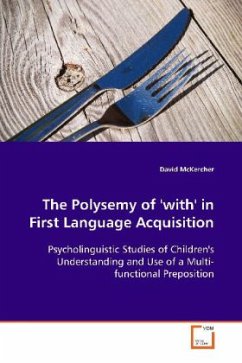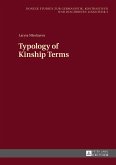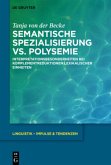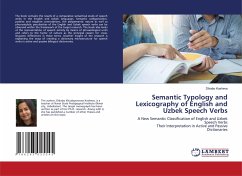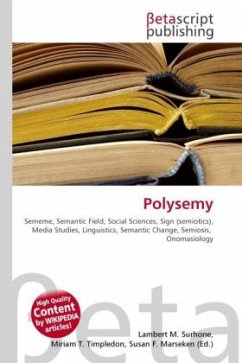The English preposition ''with'' is polysemous in that
it has multiple distinct senses. It can be used to
mark instruments (''He ate with a fork''),
accompaniments (''He ate with a friend'', ''He ate pizza
with a salad''), manner (''He ate with enthusiasm'') and
attributes (''He ate pizza with anchovies''). How do
children learning English as their first language
deal with the polysemy of ''with''? This book presents
evidence from a corpus study and three
psycholinguistic experiments that suggests that
children begin with a general meaning of
accompaniment. This leads to over-generalization such
that children occasionally answer questions such as
"What is he eating with?" with a "food" answer. In
production, errors of the form "He''s going to cut the
knife with the apple" can be elicited and statements
of the form "She''s eating cake with a fork" are
sometimes answered as true even when the fork is
simply present but not being used. This book will be
of interest to linguists and
psycholinguists who have wondered about the meanings
of prepositions and about how multiple meanings are
dealt with in first language acquisition.
it has multiple distinct senses. It can be used to
mark instruments (''He ate with a fork''),
accompaniments (''He ate with a friend'', ''He ate pizza
with a salad''), manner (''He ate with enthusiasm'') and
attributes (''He ate pizza with anchovies''). How do
children learning English as their first language
deal with the polysemy of ''with''? This book presents
evidence from a corpus study and three
psycholinguistic experiments that suggests that
children begin with a general meaning of
accompaniment. This leads to over-generalization such
that children occasionally answer questions such as
"What is he eating with?" with a "food" answer. In
production, errors of the form "He''s going to cut the
knife with the apple" can be elicited and statements
of the form "She''s eating cake with a fork" are
sometimes answered as true even when the fork is
simply present but not being used. This book will be
of interest to linguists and
psycholinguists who have wondered about the meanings
of prepositions and about how multiple meanings are
dealt with in first language acquisition.

